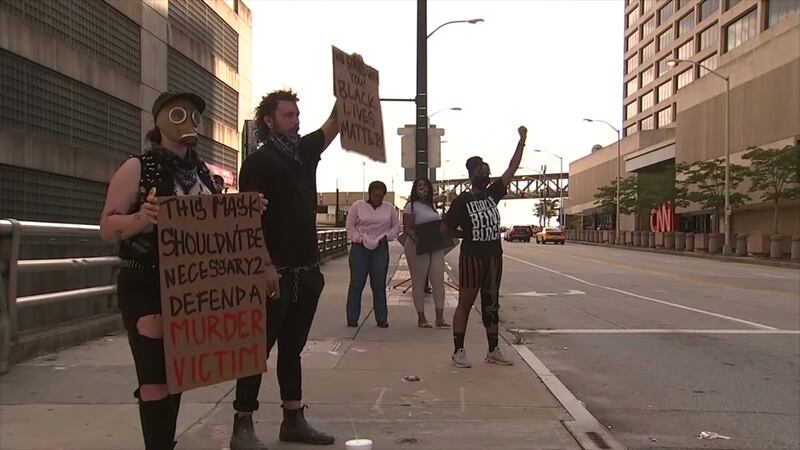ATLANTA — Local leaders are speaking out about the death of George Floyd in Minneapolis.
Unrest ravaged several blocks in the Longfellow neighborhood in Minneapolis for a third night Thursday, with scattered rioting reaching for miles across the city.
This comes just days after video footage recorded by a bystander showed Floyd pleading that he couldn’t breathe as an officer kneeled on his neck. As the minutes passed, he slowly stopped talking and moving. He was later declared dead in a nearby hospital.
[READ: Rioters set fire to Minneapolis police precinct in protests over George Floyd]
The officers were fired from the department, but none are currently facing charges in the case.
Now, community leaders across the Atlanta metro are speaking out about what needs to happen so that something like this doesn’t happen again.
"It was heartbreaking. I was angry. It's just deeply disturbing to know that my sons and our young people had to watch that right before their eyes," attorney and activist Mawuli Davis said.
Davis told Channel 2 anchor Jovita Moore that the final moments of Floyd’s life speaks to a much deeper issue.
"When you see something like that happen, do you think 'not again' or do you think 'again,'” Moore asked Davis.
"I think again. I don't think that we have adequately addressed our issues of race in America," Davis said.
Moore also spoke with Dr. Bernice King. This was her reaction.
TRENDING STORIES:
- Kemp extends public health state of emergency; allows bars, nightclubs to open
- Officials say size of Lovett high school COVID-19 cluster unclear because families reluctant to talk
- Georgia teacher paralyzed after ’catastrophic’ inflatable waterslide accident
“The thing that really got to me the most is that there were three other officers who stood there, participated in, complicit with and did nothing. Didn’t pull the officer off, didn’t say, ‘Hey man, stop,’” King said.
“It's hard to have hope when you see this kind of case, and you see this kind of police violence that we chronicle as history in our center, but it's clearly not history,” said Jill Savitt, executive at the Center for Human and Civil Rights in downtown Atlanta.
Situations that continue to repeat — black men who die at the hands of white officers. The reason for their arrest not commensurate with the outcome of the arrest. And the force involved often considered unnecessarily excessive.
"With officers holding him down, he says repeatedly, ‘I can't breathe,’” Davis said. "I think there's a general disregard for the pain of black people — in particular, black men — that it’s easy to criminalize black men and not see us as human beings."
“You could look at the face of that officer — the posture and even shifting in his body to add even more weight. He was intending to kill him and cut off his breath. Bottom line," King said.
Savitt said the image was shocking.
"They say what they've always said, which is the ideology or this racism that exists within the police force that still marks black people as different to be treated different," Savitt said. “It's not fair, and it's not right, and it’s hard to believe after all the tragedy we've seen that there hasn't been more systematic change within the police departments where this kind of behavior would not be tolerated."
All three say change has to be made and has to be a collective effort made by everyone on all sides.
"There’s a lot of work to do. But as I said, white people have to get involved in this work. And I’m especially talking about those white people who have been on the sidelines, who have taken advantage of their privilege in this country and who refuse to see these things and refuse to acknowledge that these things are not right," King said.
"It will continue to happen until we have a really deep dive into racism and white supremacy in America,” Davis said.
“Those of us who are people of conscience, who care about all lives — black lives in particular — need to come together, and I think the onus is in particular on the white community," Savitt said. “It's really up to the white community and every other community in this country to say we will not stand for this."
And perhaps there will be justice.
"From prosecution and additional federal prosecution, the conviction, and the conviction should reflect the loss of life,” Davis said.
The Associated Press contributed to this article.
© 2020 Cox Media Group





